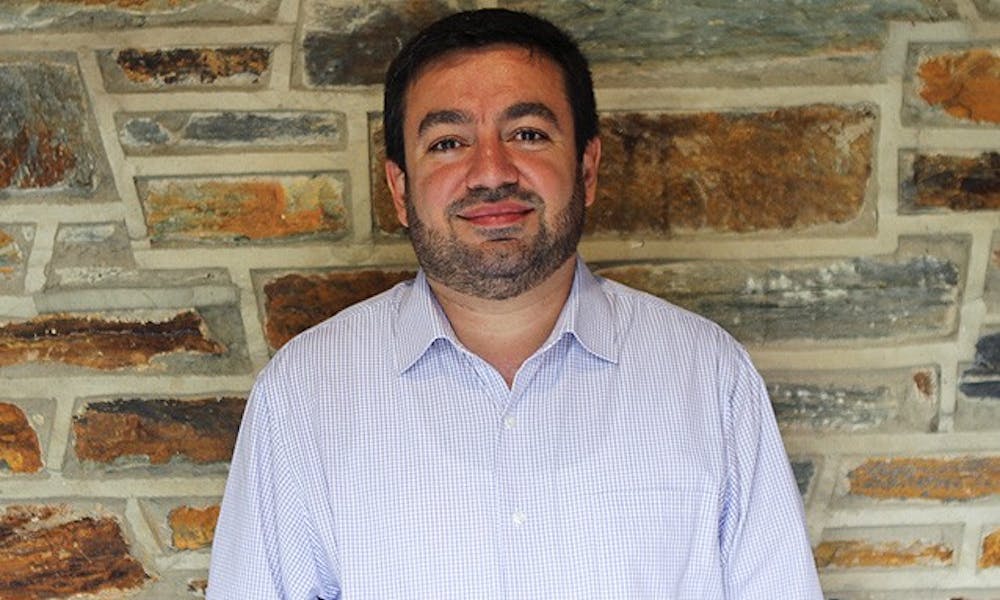Fifty-two attorneys wrote a petition letter Oct. 25 and demanded that Village Voice Media shut down the adult section of its classified website, backpage.com, which has been used to promote the sex trafficking of minors. Duke’s Muslim chaplain Abdullah Antepli was among the 36 prominent clergy members from the United States to sign this petition letter. Prior to coming to Duke, Antepli spent years in South East Asia fighting against sex trafficking. The Chronicle’s Shucao Mo spoke with Antepli Thursday to discuss his thoughts on the humanitarian relief activism he has been involved in as a Muslim.
The Chronicle: How did you get involved in this petition? How was that related to your religious conviction?
Abdullah Antepli: I spent eight years establishing small size orphanages in the rural areas of Myanmar, Cambodia, Laos and Burma, basically combating sex slavery. This issue is a deep-rooted passion of mine.... It is a moral responsibility for everyone: our silence makes us guilty. So, when I was approached by this newly-formed interfaith organization to reveal [Village Voice Media’s usage] of this backdoor website. Many newspapers have reported on how the website was used for sex trafficking of minors. Half of the sex slaves are extremely poor, underprivileged American citizens, and the other half are illegal immigrants.
TC: Do Muslims believe in self-ownership of one’s own body? Who are considered as sinners in Muslim religion, e.g., sex traffickers and terrorists?
AA: The concept of freedom in Islam prohibits us from harming ourselves. Every human being, regardless of gender or religion, is created in the image of God—there is a divinely endowed human dignity in every human body. If you look at the way we treat dead bodies and prisoners-of-war, it is so clear that we [think that we] cannot desecrate and insult the human body. Sex slaves are not committing a sin, though they are getting involved in a sinful act.... I spent the last 10 years of my life telling the world and myself that terrorists are not Islamic, that they are an absolute violation and distortion of Islam. Sinners—terrorists and sex traffickers—go against their own conscience and nature intentionally. At the bottom of their heart, I believe they know [what they are doing is] wrong and evil. Terrorists do not sit in their home, read Koran and become violent. I wish it is that simple, that it is because of a few words in Koran. Religion itself does not become violent, until and unless it emerges with certain social, economical and political realities.
TC: What is the most rewarding experience you had in dealing with sex trafficking?
AA: I received a phone call from one particular boy, Aung, a couple months ago. I “bought” him from his parents 14 years ago, that is, we paid financial support to their parents so their children would be not be sold for sex slavery, and then we put them in orphanages, run by Muslim churches. The Muslim faith-based organization I worked for was called Kimse Yok Mu—the best charity organization I could think of when donating money. Aung told me, crying, that he got into medical school. Both of his brothers died of HIV and sexual abuse at the age of 17 and 18, respectively. Most of these children never see their 20th birthday. I have no doubt that he will go back to his country and save more children.
TC: What’s the mission of this newly formed faith coalition group that produced this petition letter? Are there any other social activism you are involved in?
AA: They brought like-minded people together to fight against sex trafficking. This [petition] is our first work. The Muslim Chapters Association, which I am the founding board member, is tackling some other human rights issue, including immigration reform. We are providing religious support for the DREAM Act. Those immigration children didn’t come to the country by themselves and yet they are on the list of being deported to countries that they have never been to. It is just not fair and immoral.
TC: What’s the difference between working for your own religious organization and for the multi-faith coalition?
AA: We can no longer survive and struggle against the common enemies on our own—we can no longer live within our bubbles.... We need a much broader inter-faith coalition because these threats go beyond religious, ethnic, gender threats. It is not easy to develop a working relationship with people who identify themselves with a different, unique kind of humanity. Often it requires developing a new language, a new perspective. Not everybody is mentally and spiritually ready. If we are involved in humanitarian relief work, that should be pure, with no strings attached. [Those human relief services] should be for the pleasure and for the sake of love. Sometimes it’s a challenge to establish an interfaith coalition and partnership upon a common ground that all of us respect.
TC: What is ideal vision of a world of faith? What are the conditions we need to fulfill before we could get there?
AA: I find it dangerous, if not disrespectful to put all religions under one name. In my ideal world those religious difference will still exist, but we will turn those differences into a blessing and celebrate them as different ways of glorying God’s name. Difference is part of our creation. Those who think that the whole world will one day believe homogenously are setting themselves up to disappointment. Our religious identity is not our most fundamental identity. What is holier and higher than our religious identity is humanity. First and former, I am a human; then I am Muslim; then I am Turkish; then I am [a] man. In that humanness, I can connect with anybody. Three majors sources of evil are dividing humanity: ignorance, poverty and antagonism toward division.
Get The Chronicle straight to your inbox
Signup for our weekly newsletter. Cancel at any time.

